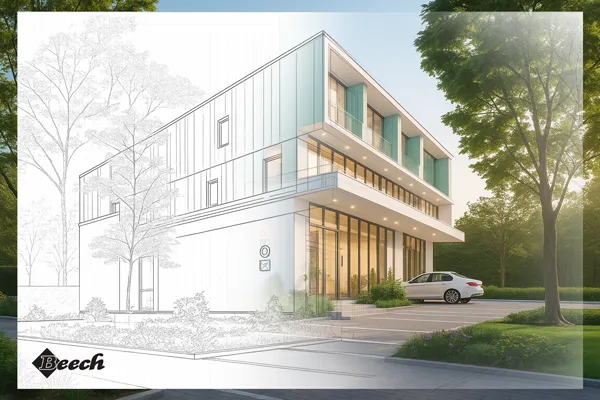
From Bare Dirt to Grand Opening
From Bare Dirt to Grand Opening: What It Takes to Build a Medical Office from the Ground Up
Building a medical office from scratch isn’t just about putting up walls and installing exam tables. It’s a meticulous process that combines strategic planning, compliance with healthcare regulations, architectural precision, and operational foresight. Every square foot of a healthcare facility serves a purpose—whether it’s improving patient flow, ensuring safety, or enabling advanced treatment delivery.
If you're a medical developer, hospital procurement leader, or planning a new Medical Office Building (MOB), understanding the full picture of ground-up construction is crucial to delivering a successful project—on time, within budget, and fully compliant.
In this guide, we break down every stage of the ground-up process, from choosing the right land to welcoming your first patient.
1. Choosing the Right Site: More Than Just Location
The first question in any ground-up healthcare project is: Where should we build? The right site offers more than visibility—it supports your long-term operational success.
Factors to consider:
Zoning and permitting: Medical offices must comply with zoning regulations, which vary by municipality.
Proximity to hospitals or major roadways: Essential for both patient access and ambulance routes.
Soil and environmental conditions: Bad soil can delay construction or require expensive remediation.
Utilities and infrastructure: Can the site support high energy, HVAC, and sanitation needs?
Tip: Always conduct a geotechnical survey before finalizing the site.
2. Pre-Construction Planning: Blueprints for Success
Before breaking ground, extensive planning ensures alignment between clinical goals and construction execution.
Key components of this phase:
Feasibility studies and budgeting
Preliminary design and space planning
Hiring your general contractor and design-build team
Establishing your project timeline
Working with an experienced builder like Beech Construction ensures your vision translates to technical feasibility from day one.
3. Healthcare-Specific Design Considerations
Designing a healthcare facility isn’t like building an office or retail space. Medical workflows, patient privacy, infection control, and ADA compliance must be baked into the design.
Design priorities include:
Efficient patient flow (from check-in to discharge)
Specialized rooms (X-ray, lab, procedure rooms)
HIPAA-compliant soundproofing and layout
HVAC and mechanical systems designed for air quality control
Hands-free accessibility features
Your design should serve both patients and providers—making it intuitive, safe, and calming.
4. Permits, Codes, and Healthcare Compliance
Healthcare construction is heavily regulated—and rightly so. A facility that doesn’t meet standards can’t open its doors.
Required areas of compliance:
State and local building codes
ADA (Americans with Disabilities Act)
OSHA and CDC regulations
NFPA for fire safety
ASHRAE and FGI Guidelines for medical facilities
Missing a permit or code requirement can delay your project by months. A licensed contractor will help you stay ahead of regulatory hurdles.
5. Groundbreaking and Site Preparation
Now the visible work begins.
Site preparation includes:
Clearing and grading
Erosion control
Utility trenching
Soil stabilization
Foundation layout
If the site includes hazardous materials, mitigation must occur before construction continues. This phase also determines your vertical construction timeline.
6. Foundation and Structural Framework
At this stage, we lay the structural backbone of the building.
Critical decisions include:
Concrete type: Medical facilities often require reinforced slabs to support heavy imaging equipment.
Steel vs. wood framing: Most MOBs require steel framing for durability and fire safety.
Load-bearing walls and roof systems: Must accommodate advanced MEP systems and potential expansion.
Structural integrity is non-negotiable—this is where Beech’s expertise in precision engineering becomes invaluable.
7. Mechanical, Electrical, and Plumbing (MEP)
Once the skeleton is up, the lifelines of the building go in.
In a medical setting, MEP systems are more complex due to:
Backup power needs
High-demand HVAC and pressurization
Specialized plumbing for surgical and exam areas
Nurse call and alarm systems
Beech Construction integrates smart MEP design to reduce energy costs, ensure redundancy, and meet health standards.
8. Interior Buildout: Function Meets Form
This is where the space starts looking like a clinic, rather than a construction zone.
Essential aspects of the interior buildout:
Flooring and wall finishes that support infection control
Built-in casework, cabinetry, and storage
Lighting and acoustics optimized for healthcare
Wayfinding and signage
This stage transforms the structure into a working healing environment—supporting both clinical efficiency and patient comfort.
9. Technology Integration: Building for the Future
Today’s medical offices are tech-powered. That means planning for:
Electronic Health Record (EHR) systems
Secure data rooms
Wi-Fi and network infrastructure
Telemedicine-ready exam rooms
Smart building automation
Designing for technology from the outset avoids costly retrofits later. Beech works with IT consultants to future-proof every build.
10. Final Inspections and Certificate of Occupancy
No medical office can open without this last hurdle: passing inspections.
Steps include:
Final fire marshal walkthrough
Elevator and lift certification
Final city/county inspections
Infection control review (if applicable)
Certificate of Occupancy (CO)
Pro tip: Schedule inspections early and confirm your general contractor handles all documentation and scheduling.
11. Training, Furnishing, and Opening Day Readiness
Before your ribbon-cutting, your staff needs to be trained in:
Safety protocols
New equipment
Patient flow procedures
Meanwhile, Beech coordinates:
FF&E (Furniture, Fixtures & Equipment) installation
Punch list corrections
Final deep cleaning and prep
This phase ensures your first day runs as smoothly as your hundredth.
Conclusion: Turning Vision into Reality
Building a medical office from the ground up is a high-stakes journey—but with the right partner, it doesn’t have to be a stressful one. From site selection to final inspections, Beech Construction delivers expertise, transparency, and medical-grade precision every step of the way.
Whether you’re expanding a healthcare system or launching a private practice, Beech is your trusted ally in building smarter, safer, and more efficient healthcare environments.
Start planning your healthcare facility with Beech today.
FAQ: Building a Medical Office from the Ground Up
1. How long does it take to build a medical office from scratch?
Typical timelines range from 12 to 24 months, depending on the complexity, size, and permitting process.
2. What’s the average cost per square foot for medical office construction?
Costs vary by region and specs, but $300 to $600 per square foot is common for modern MOBs with advanced systems.
3. Can I use a design-build firm for my healthcare project?
Yes. In fact, design-build reduces risks and improves coordination, making it ideal for medical projects.
4. What permits do I need to open a medical office?
Expect to secure zoning, building, occupancy, and healthcare-specific permits, including those for radiology or surgical spaces.
5. How can Beech Construction help streamline the process?
Beech brings healthcare-specific expertise, proven project management, and a turnkey delivery model that aligns design, construction, and compliance from day one.


